By TOM KRISHER and BRUCE SCHREINER

1 of 5
A truck drives down a rural road near a water tower marking the location of the Memphis Regional Megasite on Sept. 24, 2021, in Stanton, Tenn. Ford Motor Co. and SK Innovation of South Korea plan to build three new electric-vehicle battery factories and an auto assembly plant by 2025 in Tennessee and Kentucky. The industrial site in Stanton will be the location for a factory to produce electric F-Series pickups and a battery factory. (AP Photo/Mark Humphrey)
GLENDALE, Ky. (AP) — Ford and a partner company say they plan to build three major electric-vehicle battery factories and an auto assembly plant by 2025 — a dramatic investment in the future of EV technology that will create an estimated 10,800 jobs and shift the automaker’s future manufacturing footprint toward the South.
The factories, to be built on sites in Kentucky and Tennessee, will make batteries for the next generation of Ford and Lincoln electric vehicles that will be produced in North America. Combined, they mark the single largest manufacturing investment the 118-year-old company has ever made and are among the largest factory outlays in the world.
Notably, the new factories will provide a vast new supply of jobs that will likely pay solid wages. Most of the new jobs will be full time, with a relatively small percentage having temporary status to fill in for vacations and absent workers.
Together with its battery partner, SK Innovation of South Korea, Ford says it will spend $5.6 billion in rural Stanton, Tennessee, where it will build a factory to produce electric F-Series pickups. A joint venture called BlueOvalSK will construct a battery factory on the same site near Memphis, plus twin battery plants in Glendale, Kentucky, near Louisville. Ford estimated the Kentucky investment at $5.8 billion and that the company’s share of the total would be $7 billion.
With the new spending, Ford is making a significant bet on a future that envisions most drivers eventually making the shift to battery power from internal combustion engines, which have powered vehicles in the United States for more than a century. Should that transition run into disruptions or delays, the gamble could hit the company’s bottom line. Ford predicts 40% to 50% of its U.S. sales will be electric by 2030. For now, only about 1% of vehicles on America’s roads are powered by electricity.
In an interview Monday, CEO Jim Farley said it would be up to the workers at the new plants to decide whether to be represented by the United Auto Workers union. That question could set up an epic battle with union leaders, who want employees of the future to join the union and earn top UAW production wages of around $32 per hour. It represents a high-stakes test for the UAW, which will need jobs for thousands of members who will lose work in the transition away engines and transmissions for petroleum-powered vehicles.
Ford’s move also could put the company at odds with President Joe Biden’s quest to create “good-paying union jobs” in a new, greener economy.
Farley said it’s too early to talk about pay or unionization at the new factories. He stressed that Ford will maintain a geographic manufacturing balance when the company’s investments in Ohio and Michigan are included. Ford and General Motors have UAW-represented plants in Kentucky and Tennessee, states where it is common for political leaders to actively campaign against unionization.
“We love our UAW partners,” Farley said. “They’ve been incredible on this journey of electrification so far. But it’s up to the employees to decide.”
Just four months ago, Ford said it would build two new battery plants in North America. But Farley said demand for the electric Mustang Mach E SUV and over 150,000 orders for the F-150 electric pickup convinced the company to increase battery output.
Farley said Ford intends to lead the world in electric vehicles, a title now held by upstart Tesla Inc., which is adding jobs at a third factory now under construction near Austin, Texas.
Ford picked the Kentucky and Tennessee sites in part because of lower electricity costs, Farley said, as well being less exposed to flooding and hurricanes than other states. Battery factories use five times the electricity of a typical assembly plant to make cells and assemble them into packs, so energy costs were a big factor, Farley said.
The company also needed huge tracts of land for the plants that weren’t available in other states, Farley said.
Both Southern states also have skilled labor forces and are willing to train workers for the new jobs, he said.
“These jobs are very different than the jobs we’ve had in the past,” Farley said. “We want to work with states who are really excited about doing that training and giving you access to that low energy cost.”
The Tennessee Valley Authority, which serves the Memphis-area site, sells industrial electricity at a price that’s lower than 93% of competitors nationwide, said CEO Jeff Lyash. Rates have stayed flat for the past decade and are planned to stay flat for the next 10 years, he said.
Combined, the three new battery plants will be able to supply enough batteries to power 1 million vehicles per year, about 129 gigawatts of power, Ford Chief Operating Officer Lisa Drake said.
Shares of Ford Motor Co., which is based in Dearborn, Michigan, rose more than 4% in extended trading after the new factories were announced late Monday.
Reaction from the union was tempered Monday, with officials seemingly optimistic about organizing the factories.
“We look forward to reaching out and helping develop this new workforce to build these world-class vehicles and battery components,” union President Ray Curry said in a statement.
Kristin Dziczek, a senior vice president at the Center for Automotive Research who follows labor issues, said the union’s future depends largely on organizing the new plants.
“It’s imperative that the UAW organize these if they’re going to have a stake in the electrification of this industry,” she said.
Union representation of the plants could become a contentious issue in the next round of national contract talks with the union in two years.
When General Motors first announced joint venture battery factories over the past few years, its executives said workers would decide on unionization. UAW officials howled in protest. In May, GM said it would support union organizing at the plants.
The Kentucky site is only about 50 miles (80 kilometers) south of Louisville, where Ford has plants that make SUVs and trucks now powered by internal combustion engines. Ford wouldn’t comment on whether those plants eventually would make electric vehicles, but Dziczek said converting at least one would make sense. One plant makes the Ford Escape small SUV, in the most popular segment of the U.S market, she said.
Kentucky Gov. Andy Beshear said in an interview that Ford’s 5,000 jobs at the Glendale battery plants is the largest single employment announcement in state history. And he said it will also bring jobs with suppliers that make components for the plants. Earlier this month state legislators approved $410 million worth of economic development incentives.
Beshear said Ford would get a loan of up to $250 million to draw on through construction. It’s forgivable if the company hits completion milestones. The package also includes the cost of the Glendale land, plus up to $36 million in training incentives, he said.
Ford will formally announce the plants with ceremonies on Tuesday at both sites. In Glendale’s one-block downtown on Monday evening, there were no signs of pending dramatic changes in the economy from the new jobs. All was quiet in the town where the primary businesses are antique shops and corn and soybean fields that stretch in all directions.
The Tennessee assembly plant is to be built on a site about 50 miles (80 kilometers) east of Memphis that’s almost six square miles (15.5 square kilometers). Combined, the assembly plant, to be run by Ford, and the battery factory, would employ about 5,800 workers.
State officials have been trying to develop the site for years without success. Gov. Bill Lee said Tennessee offered Ford $500 million in incentives to win a contest with 15 other states. Lee said he is confident legislators will approve the spending.
____
Krisher reported from Detroit. Associated Press Writer Kimberlee Kruesi contributed from Nashville, Tennessee.
GLENDALE, Ky. (AP) — Ford and a partner company say they plan to build three major electric-vehicle battery factories and an auto assembly plant by 2025 — a dramatic investment in the future of EV technology that will create an estimated 10,800 jobs and shift the automaker’s future manufacturing footprint toward the South.
The factories, to be built on sites in Kentucky and Tennessee, will make batteries for the next generation of Ford and Lincoln electric vehicles that will be produced in North America. Combined, they mark the single largest manufacturing investment the 118-year-old company has ever made and are among the largest factory outlays in the world.
Notably, the new factories will provide a vast new supply of jobs that will likely pay solid wages. Most of the new jobs will be full time, with a relatively small percentage having temporary status to fill in for vacations and absent workers.
Together with its battery partner, SK Innovation of South Korea, Ford says it will spend $5.6 billion in rural Stanton, Tennessee, where it will build a factory to produce electric F-Series pickups. A joint venture called BlueOvalSK will construct a battery factory on the same site near Memphis, plus twin battery plants in Glendale, Kentucky, near Louisville. Ford estimated the Kentucky investment at $5.8 billion and that the company’s share of the total would be $7 billion.
With the new spending, Ford is making a significant bet on a future that envisions most drivers eventually making the shift to battery power from internal combustion engines, which have powered vehicles in the United States for more than a century. Should that transition run into disruptions or delays, the gamble could hit the company’s bottom line. Ford predicts 40% to 50% of its U.S. sales will be electric by 2030. For now, only about 1% of vehicles on America’s roads are powered by electricity.
In an interview Monday, CEO Jim Farley said it would be up to the workers at the new plants to decide whether to be represented by the United Auto Workers union. That question could set up an epic battle with union leaders, who want employees of the future to join the union and earn top UAW production wages of around $32 per hour. It represents a high-stakes test for the UAW, which will need jobs for thousands of members who will lose work in the transition away engines and transmissions for petroleum-powered vehicles.
Ford’s move also could put the company at odds with President Joe Biden’s quest to create “good-paying union jobs” in a new, greener economy.
Farley said it’s too early to talk about pay or unionization at the new factories. He stressed that Ford will maintain a geographic manufacturing balance when the company’s investments in Ohio and Michigan are included. Ford and General Motors have UAW-represented plants in Kentucky and Tennessee, states where it is common for political leaders to actively campaign against unionization.
“We love our UAW partners,” Farley said. “They’ve been incredible on this journey of electrification so far. But it’s up to the employees to decide.”
Just four months ago, Ford said it would build two new battery plants in North America. But Farley said demand for the electric Mustang Mach E SUV and over 150,000 orders for the F-150 electric pickup convinced the company to increase battery output.
Farley said Ford intends to lead the world in electric vehicles, a title now held by upstart Tesla Inc., which is adding jobs at a third factory now under construction near Austin, Texas.
Ford picked the Kentucky and Tennessee sites in part because of lower electricity costs, Farley said, as well being less exposed to flooding and hurricanes than other states. Battery factories use five times the electricity of a typical assembly plant to make cells and assemble them into packs, so energy costs were a big factor, Farley said.
The company also needed huge tracts of land for the plants that weren’t available in other states, Farley said.
Both Southern states also have skilled labor forces and are willing to train workers for the new jobs, he said.
“These jobs are very different than the jobs we’ve had in the past,” Farley said. “We want to work with states who are really excited about doing that training and giving you access to that low energy cost.”
The Tennessee Valley Authority, which serves the Memphis-area site, sells industrial electricity at a price that’s lower than 93% of competitors nationwide, said CEO Jeff Lyash. Rates have stayed flat for the past decade and are planned to stay flat for the next 10 years, he said.
Combined, the three new battery plants will be able to supply enough batteries to power 1 million vehicles per year, about 129 gigawatts of power, Ford Chief Operating Officer Lisa Drake said.
Shares of Ford Motor Co., which is based in Dearborn, Michigan, rose more than 4% in extended trading after the new factories were announced late Monday.
Reaction from the union was tempered Monday, with officials seemingly optimistic about organizing the factories.
“We look forward to reaching out and helping develop this new workforce to build these world-class vehicles and battery components,” union President Ray Curry said in a statement.
Kristin Dziczek, a senior vice president at the Center for Automotive Research who follows labor issues, said the union’s future depends largely on organizing the new plants.
“It’s imperative that the UAW organize these if they’re going to have a stake in the electrification of this industry,” she said.
Union representation of the plants could become a contentious issue in the next round of national contract talks with the union in two years.
When General Motors first announced joint venture battery factories over the past few years, its executives said workers would decide on unionization. UAW officials howled in protest. In May, GM said it would support union organizing at the plants.
The Kentucky site is only about 50 miles (80 kilometers) south of Louisville, where Ford has plants that make SUVs and trucks now powered by internal combustion engines. Ford wouldn’t comment on whether those plants eventually would make electric vehicles, but Dziczek said converting at least one would make sense. One plant makes the Ford Escape small SUV, in the most popular segment of the U.S market, she said.
Kentucky Gov. Andy Beshear said in an interview that Ford’s 5,000 jobs at the Glendale battery plants is the largest single employment announcement in state history. And he said it will also bring jobs with suppliers that make components for the plants. Earlier this month state legislators approved $410 million worth of economic development incentives.
Beshear said Ford would get a loan of up to $250 million to draw on through construction. It’s forgivable if the company hits completion milestones. The package also includes the cost of the Glendale land, plus up to $36 million in training incentives, he said.
Ford will formally announce the plants with ceremonies on Tuesday at both sites. In Glendale’s one-block downtown on Monday evening, there were no signs of pending dramatic changes in the economy from the new jobs. All was quiet in the town where the primary businesses are antique shops and corn and soybean fields that stretch in all directions.
The Tennessee assembly plant is to be built on a site about 50 miles (80 kilometers) east of Memphis that’s almost six square miles (15.5 square kilometers). Combined, the assembly plant, to be run by Ford, and the battery factory, would employ about 5,800 workers.
State officials have been trying to develop the site for years without success. Gov. Bill Lee said Tennessee offered Ford $500 million in incentives to win a contest with 15 other states. Lee said he is confident legislators will approve the spending.
____
Krisher reported from Detroit. Associated Press Writer Kimberlee Kruesi contributed from Nashville, Tennessee.
Green energy takes hold in unlikely places with Ford project
by Bruce Schreiner, Tom Krisher and Adrian Sainz
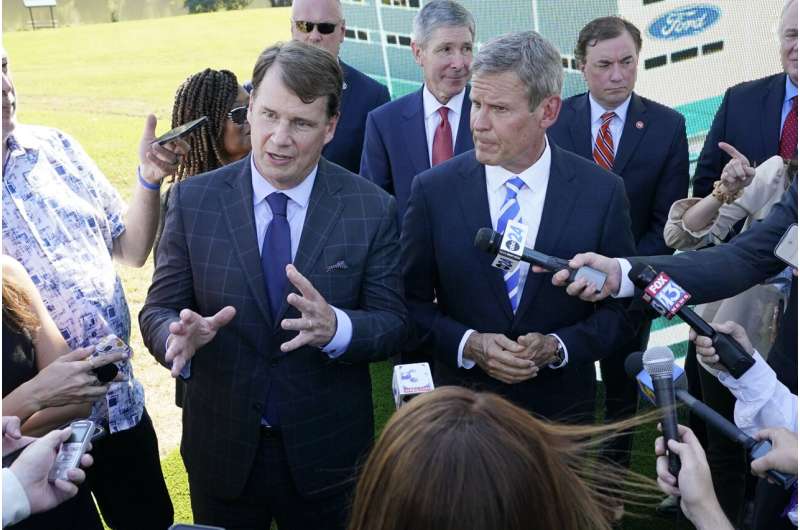
Jim Farley, Ford president and CEO, center left, along with Tennessee Gov. Bill Lee, center right, answers questions along with after a presentation on the planned factory to build electric F-Series trucks and the batteries to power future electric Ford and Lincoln vehicles Tuesday, Sept. 28, 2021, in Memphis, Tenn. The plant in Tennessee is to be built near Stanton, Tenn. Credit: AP Photo/Mark Humphrey
When Ford revealed plans to ramp up its commitment to the fledgling electric vehicle sector, the automaker chose to create thousands of jobs and pump billions in investments into two states where Republican leaders have vilified the push for green energy and defended fossil fuels.
Teaming with its battery partner, SK Innovation of South Korea, Ford said Monday it will spend $5.6 billion in Stanton, Tennessee, where it will build a factory to produce electric F-Series pickups. A joint venture called BlueOvalSK will construct a battery factory on the same site near Memphis, plus twin battery plants in Glendale, Kentucky. Ford estimated the Kentucky investment at $5.8 billion. The single largest manufacturing venture in the iconic company's history will create an estimated 10,800 jobs.
Choosing Tennessee and Kentucky for the coveted mega-projects created an ironic disconnect between the automaker's high-stakes bet on the future of battery-powered vehicles and the rhetoric from many Republican leaders who have railed against a shift toward green energy and away from fossil fuels.
On Monday, Senate Republican leader Mitch McConnell applauded Ford for giving an economic boost to Kentucky, saying it solidified his home state's position "as a world-class automotive state on the cutting edge of research and development." McConnell sounded a different theme two months earlier, when he took to the Senate floor to blast Democrats for wanting to "wage war on fossil fuels" and tried to turn their efforts to promote electric vehicles into a wedge issue.
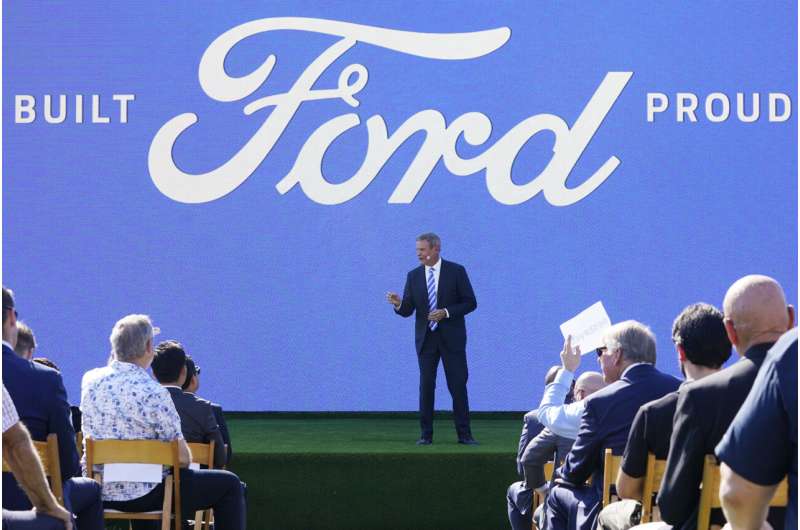
When Ford revealed plans to ramp up its commitment to the fledgling electric vehicle sector, the automaker chose to create thousands of jobs and pump billions in investments into two states where Republican leaders have vilified the push for green energy and defended fossil fuels.
Teaming with its battery partner, SK Innovation of South Korea, Ford said Monday it will spend $5.6 billion in Stanton, Tennessee, where it will build a factory to produce electric F-Series pickups. A joint venture called BlueOvalSK will construct a battery factory on the same site near Memphis, plus twin battery plants in Glendale, Kentucky. Ford estimated the Kentucky investment at $5.8 billion. The single largest manufacturing venture in the iconic company's history will create an estimated 10,800 jobs.
Choosing Tennessee and Kentucky for the coveted mega-projects created an ironic disconnect between the automaker's high-stakes bet on the future of battery-powered vehicles and the rhetoric from many Republican leaders who have railed against a shift toward green energy and away from fossil fuels.
On Monday, Senate Republican leader Mitch McConnell applauded Ford for giving an economic boost to Kentucky, saying it solidified his home state's position "as a world-class automotive state on the cutting edge of research and development." McConnell sounded a different theme two months earlier, when he took to the Senate floor to blast Democrats for wanting to "wage war on fossil fuels" and tried to turn their efforts to promote electric vehicles into a wedge issue.

Tennessee Gov. Bill Lee speaks during a presentation on the planned factory to build electric F-Series trucks and the batteries to power future electric Ford and Lincoln vehicles Tuesday, Sept. 28, 2021, in Memphis, Tenn. The plant in Tennessee is to be built near Stanton, Tenn. Credit: AP Photo/Mark Humphrey
"They want to further expand giant tax credit giveaways for costly electric cars—when 80% of it is going to households earning six figures and up," McConnell said in July. "They also want money and mandates to push the entire federal government fleet toward electric cars, too. Wouldn't you just love to see an IRS auditor pull up to your tax audit in a $97,000 Tesla?"
In Kentucky, where Republican state lawmakers recently joined Democratic Gov. Andy Beshear in approving an incentives package credited with helping lure the battery project to Glendale, hostility toward green energy has focused on the decline of coal production and the erosion of good-paying mining jobs in regions that depended on them. The battery plants will be built in central Kentucky, a lengthy drive from the coalfields of eastern and western Kentucky.
Kentucky Republican Sen. Rand Paul, who tweeted out his thanks to Ford for its latest investment in the state, routinely lambastes the Green New Deal. In 2019, he condemned it as an "industry-killing, all-out assault on our way of life in Kentucky" and an attack on automobile makers.
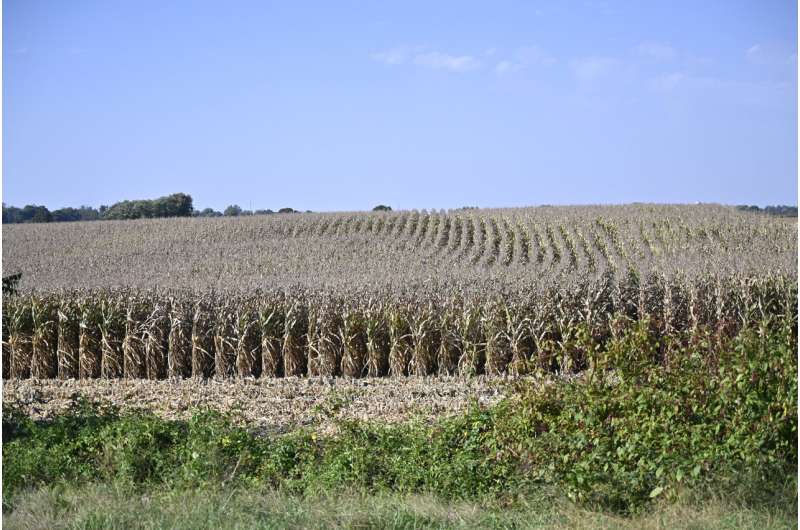
"They want to further expand giant tax credit giveaways for costly electric cars—when 80% of it is going to households earning six figures and up," McConnell said in July. "They also want money and mandates to push the entire federal government fleet toward electric cars, too. Wouldn't you just love to see an IRS auditor pull up to your tax audit in a $97,000 Tesla?"
In Kentucky, where Republican state lawmakers recently joined Democratic Gov. Andy Beshear in approving an incentives package credited with helping lure the battery project to Glendale, hostility toward green energy has focused on the decline of coal production and the erosion of good-paying mining jobs in regions that depended on them. The battery plants will be built in central Kentucky, a lengthy drive from the coalfields of eastern and western Kentucky.
Kentucky Republican Sen. Rand Paul, who tweeted out his thanks to Ford for its latest investment in the state, routinely lambastes the Green New Deal. In 2019, he condemned it as an "industry-killing, all-out assault on our way of life in Kentucky" and an attack on automobile makers.

This Monday, Sept. 27, 2021, photo, shows a 1,551-acre field which will become the site of of a joint venture with Ford Motor Company and SK Innovation to create the $5.8 billion BlueOvalSK Battery Park in Glendale, Ky. The dedicated battery manufacturing complex is intended to supply Ford's North American assembly plants with locally assembled batteries. Credit: AP Photo/Timothy D. Easley
Tennessee GOP Sen. Marsha Blackburn said the project "will transform the landscape of West Tennessee." Last month, in explaining her vote against a $1 trillion infrastructure plan, she said much of the legislation amounted to a "gateway to socialism—a lot of Green New Deal in there." She said that Tennesseans "don't want the Green New Deal."
Scott Jennings, a Kentuckian and former adviser to Republican President George W. Bush, said Tuesday that politicians generally support economic development "however they can get it."
"And as for Republicans, at least most of us, we support markets," he said. "And if the market bears the production of electric vehicles then I don't think anyone will see this as an affront to their culture or energy heritage. There's still a role for coal and other fossil fuels in this world ... and this plant won't change that. I've always viewed conservatives as being for 'all of the above' energy strategies and this certainly fits that slogan."
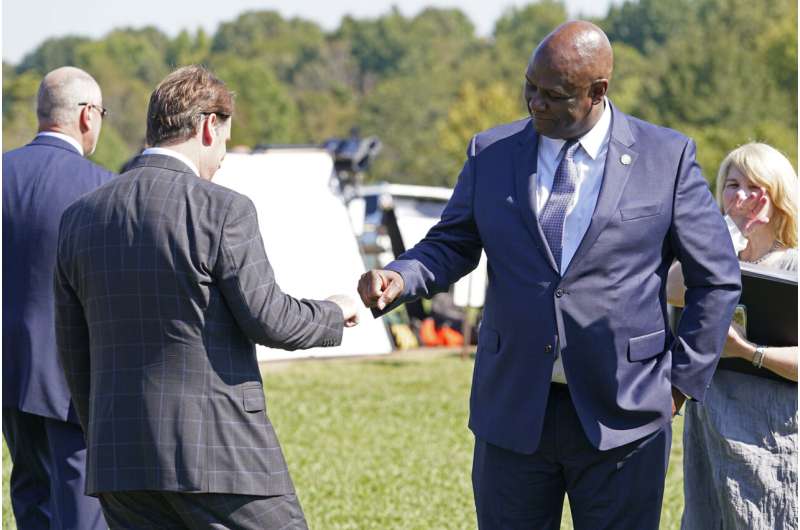
Tennessee GOP Sen. Marsha Blackburn said the project "will transform the landscape of West Tennessee." Last month, in explaining her vote against a $1 trillion infrastructure plan, she said much of the legislation amounted to a "gateway to socialism—a lot of Green New Deal in there." She said that Tennesseans "don't want the Green New Deal."
Scott Jennings, a Kentuckian and former adviser to Republican President George W. Bush, said Tuesday that politicians generally support economic development "however they can get it."
"And as for Republicans, at least most of us, we support markets," he said. "And if the market bears the production of electric vehicles then I don't think anyone will see this as an affront to their culture or energy heritage. There's still a role for coal and other fossil fuels in this world ... and this plant won't change that. I've always viewed conservatives as being for 'all of the above' energy strategies and this certainly fits that slogan."

United Auto Workers President Ray Curry, right, bumps fists with Jim Farley, Ford president and CEO, left, after a presentation on the planned factory to build electric F-Series trucks and the batteries to power future electric Ford and Lincoln vehicles Tuesday, Sept. 28, 2021, in Memphis, Tenn. The plant in Tennessee is to be built near Stanton, Tenn. Credit: AP Photo/Mark Humphrey
Beshear, who led the push that landed the state's single largest economic development project ever with the Glendale battery production project, said the private sector is leading the conversion toward green jobs.
"And so everybody else is going to have to get on board," Beshear told The Associated Press in an interview Monday. "But let me say, there's a big difference between theoretical arguments that go on in Washington, D.C., and the prospect of thousands of jobs here at home."
Ford picked the Kentucky and Tennessee sites in part because of lower electricity costs, CEO Jim Farley said, as well as being less exposed to flooding and hurricanes than other states. Battery factories use five times the electricity of a typical assembly plant to make cells and assemble them into packs, so energy costs were a big factor, Farley said.
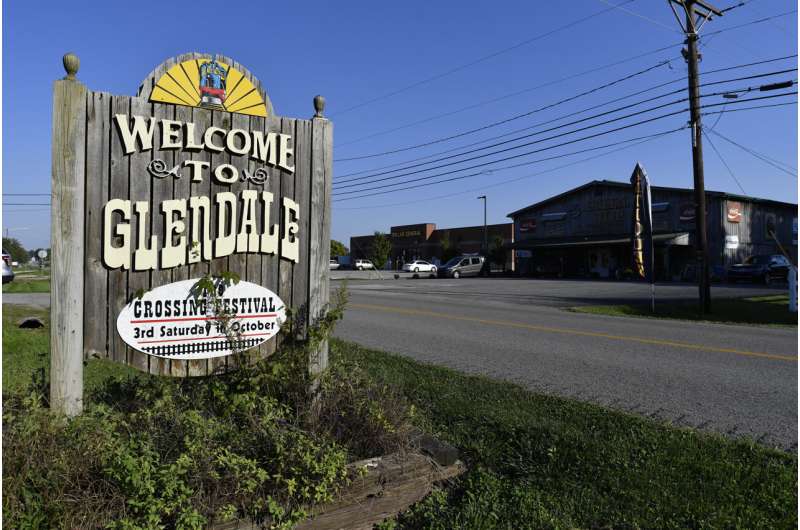
Beshear, who led the push that landed the state's single largest economic development project ever with the Glendale battery production project, said the private sector is leading the conversion toward green jobs.
"And so everybody else is going to have to get on board," Beshear told The Associated Press in an interview Monday. "But let me say, there's a big difference between theoretical arguments that go on in Washington, D.C., and the prospect of thousands of jobs here at home."
Ford picked the Kentucky and Tennessee sites in part because of lower electricity costs, CEO Jim Farley said, as well as being less exposed to flooding and hurricanes than other states. Battery factories use five times the electricity of a typical assembly plant to make cells and assemble them into packs, so energy costs were a big factor, Farley said.

A sign welcomes visitors to the tiny town of Glendale, Ky., the site of a joint venture with Ford Motor Company and SK Innovation to create the $5.8 billion BlueOvalSK Battery Park in Glendale, Ky., Monday, Sept. 27, 2021. The dedicated battery manufacturing complex will be creating 5000 jobs, and is intended to supply Ford's North American assembly plants with locally assembled batteries. Credit: AP Photo/Timothy D. Easley
In an interview Monday, Farley said workers at the Tennessee and Kentucky plants will decide whether they want to be represented by the United Auto Workers union. It's common for political leaders in both states to actively campaign against unionization.
At the Tennessee news conference Tuesday, UAW President Ray Curry told The Associated Press that the union has a long history with Ford and he's optimistic about organizing the battery factories and assembly plant.
He conceded that there's no agreement at present between the union and Ford for the Tennessee site.
Both Kentucky and Tennessee have "right to work" laws, which stop companies and unions from signing contracts that require workers to pay union dues. Tennessee voters will decide next year on a constitutional amendment enshrining right to work and making it harder to repeal. Curry said the amendment doesn't complicate matters with Ford.
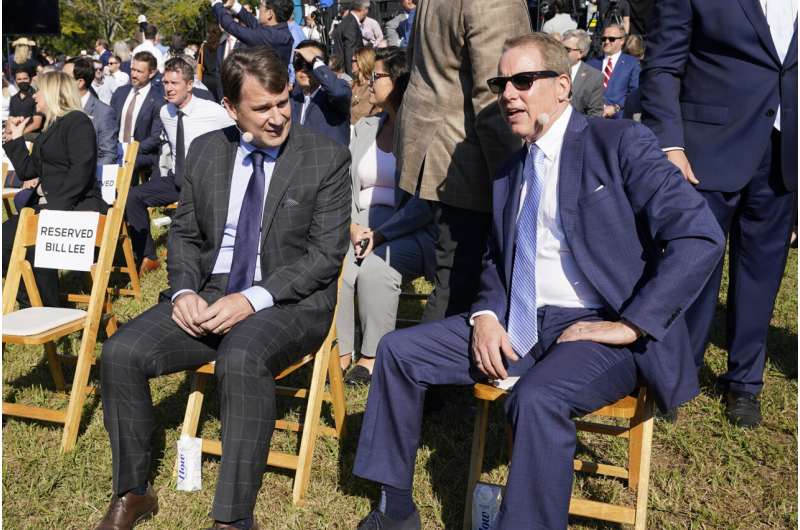
In an interview Monday, Farley said workers at the Tennessee and Kentucky plants will decide whether they want to be represented by the United Auto Workers union. It's common for political leaders in both states to actively campaign against unionization.
At the Tennessee news conference Tuesday, UAW President Ray Curry told The Associated Press that the union has a long history with Ford and he's optimistic about organizing the battery factories and assembly plant.
He conceded that there's no agreement at present between the union and Ford for the Tennessee site.
Both Kentucky and Tennessee have "right to work" laws, which stop companies and unions from signing contracts that require workers to pay union dues. Tennessee voters will decide next year on a constitutional amendment enshrining right to work and making it harder to repeal. Curry said the amendment doesn't complicate matters with Ford.

Jim Farley, Ford president and CEO, left, and Ford Executive Chairman Bill Ford, right, talk before a presentation on the planned factory to build electric F-Series trucks and the batteries to power future electric Ford and Lincoln vehicles Tuesday, Sept. 28, 2021, in Memphis, Tenn. The plant in Tennessee is to be built near Stanton, Tenn. Credit: AP Photo/Mark Humphrey
Asked if he thought Ford located plants in Tennessee to avoid the union, Curry replied: "absolutely not."
In Glendale, a tiny community ringed by corn and soybean fields about 50 miles (80 kilometers) south of Louisville, residents seemed ready to embrace the newfound ties to the green energy movement and the fight against climate change.
"That's good for my grandkids," said Wayne Noe, a farmer and retired union carpenter.
Laura Tabb said it's "fantastic" that Ford's arrival will hoist Glendale onto the "cutting edge of a green technology." She said the fight against climate change shouldn't be a political issue.
"Everyone should be on board with trying to save the planet," she said. "Who doesn't want to save the planet? If you're opposed to measures that will help make things greener, you're on the wrong side of history."
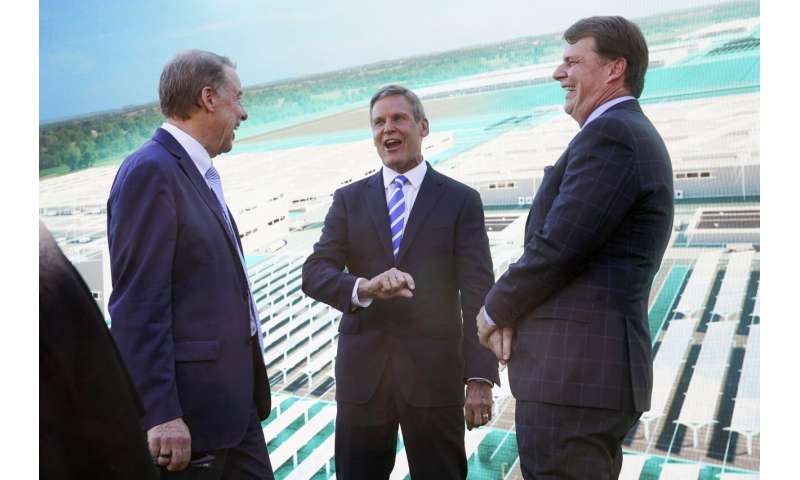
Asked if he thought Ford located plants in Tennessee to avoid the union, Curry replied: "absolutely not."
In Glendale, a tiny community ringed by corn and soybean fields about 50 miles (80 kilometers) south of Louisville, residents seemed ready to embrace the newfound ties to the green energy movement and the fight against climate change.
"That's good for my grandkids," said Wayne Noe, a farmer and retired union carpenter.
Laura Tabb said it's "fantastic" that Ford's arrival will hoist Glendale onto the "cutting edge of a green technology." She said the fight against climate change shouldn't be a political issue.
"Everyone should be on board with trying to save the planet," she said. "Who doesn't want to save the planet? If you're opposed to measures that will help make things greener, you're on the wrong side of history."

Tennessee Gov. Bill Lee, center, talks with Ford Executive Chairman Bill Ford, left, and Jim Farley, Ford president and CEO, right, after a presentation on the planned factory to build electric F-Series trucks and the batteries to power future electric Ford and Lincoln vehicles Tuesday, Sept. 28, 2021, in Memphis, Tenn. The plant in Tennessee is to be built near Stanton, Tenn. Credit: AP Photo/Mark Humphrey


This Monday, Sept. 27, 2021, photo shows a 1,551-acre field which will become the site of of a joint venture with Ford Motor Company and SK Innovation to create the $5.8 billion BlueOvalSK Battery Park in Glendale, Ky. The dedicated battery manufacturing complex is intended to supply Ford's North American assembly plants with locally assembled batteries. Credit: AP Photo/Timothy D. Easley


A 1,551-acre field, seen Monday, Sept. 27, 2021, will become the site of of a joint venture with Ford Motor Company and SK Innovation to create the $5.8 billion BlueOvalSK Battery Park in Glendale, Ky. The dedicated battery manufacturing complex will be creating 5,000 jobs, and is intended to supply Ford's North American assembly plants with locally assembled batteries. Credit: AP Photo/Timothy D. Easley
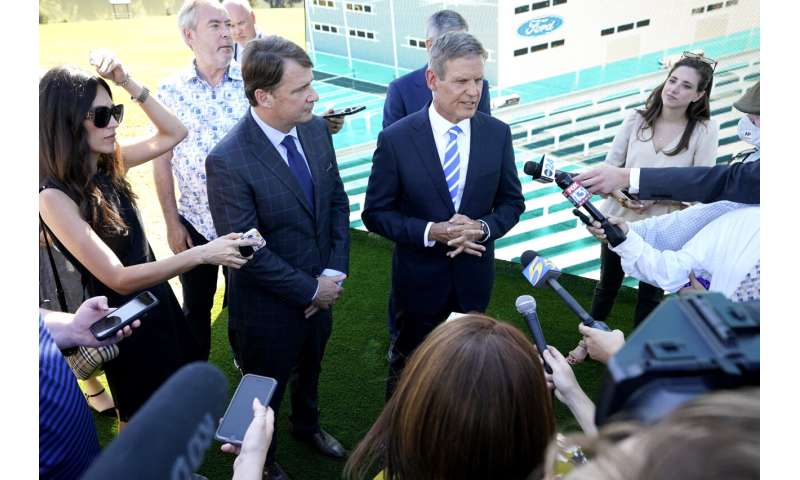

Tennessee Gov. Bill Lee, center right, answers questions along with Jim Farley, Ford president and CEO, center left, after a presentation on the planned factory to build electric F-Series trucks and the batteries to power future electric Ford and Lincoln vehicles Tuesday, Sept. 28, 2021, in Memphis, Tenn. The plant in Tennessee is to be built near Stanton, Tenn. Credit: AP Photo/Mark Humphrey
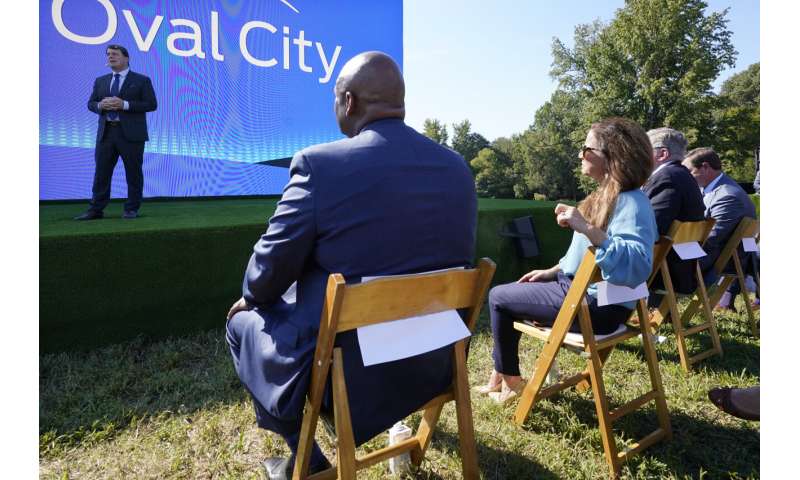

United Auto Workers President Ray Curry, seated at left, listens as Jim Farley, Ford president and CEO, speaks during a presentation on the planned factory to build electric F-Series trucks and the batteries to power future electric Ford and Lincoln vehicles Tuesday, Sept. 28, 2021, in Memphis, Tenn. The plant in Tennessee is to be built near Stanton, Tenn. Credit: AP Photo/Mark Humphrey
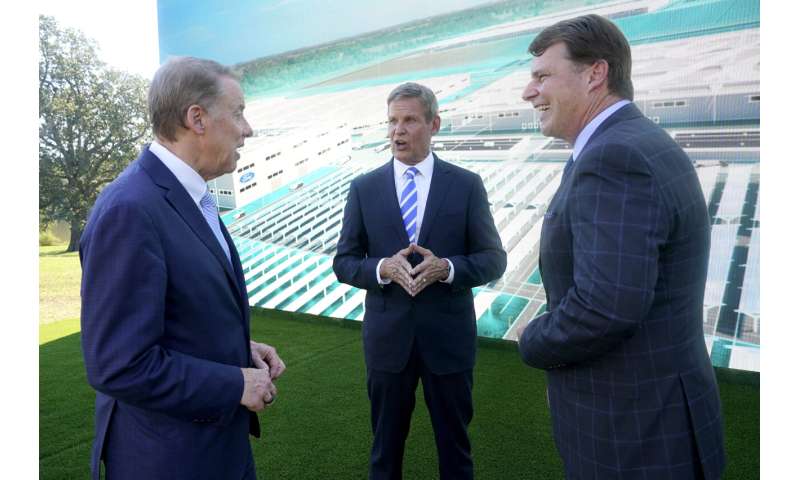

Ford Executive Chairman Bill Ford, left, and Jim Farley, Ford president and CEO, right, talk with Tennessee Gov. Bill Lee, center, after a presentation on the planned factory to build electric F-Series trucks and the batteries to power future electric Ford and Lincoln vehicles Tuesday, Sept. 28, 2021, in Memphis, Tenn. The plant in Tennessee is to be built near Stanton, Tenn. Credit: AP Photo/Mark Humphrey
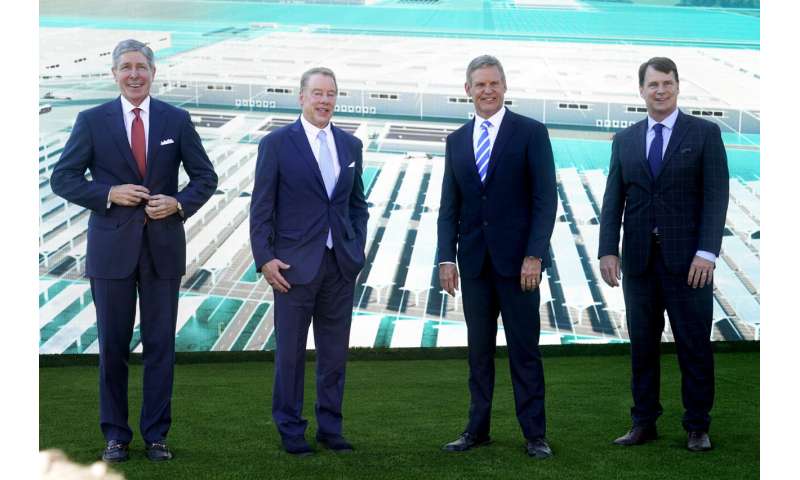

Tennessee Economic and Community Development Commissioner Bob Rolfe, left; Ford Executive Chairman Bill Ford, second from left; Tennessee Gov. Bill Lee, second from right; and Jim Farley, Ford president and CEO, right; pose together for pictures after a presentation on the planned factory to build electric F-Series trucks and the batteries to power future electric Ford and Lincoln vehicles Tuesday, Sept. 28, 2021, in Memphis, Tenn. The plant in Tennessee is to be built near Stanton, Tenn. Credit: AP Photo/Mark Humphrey
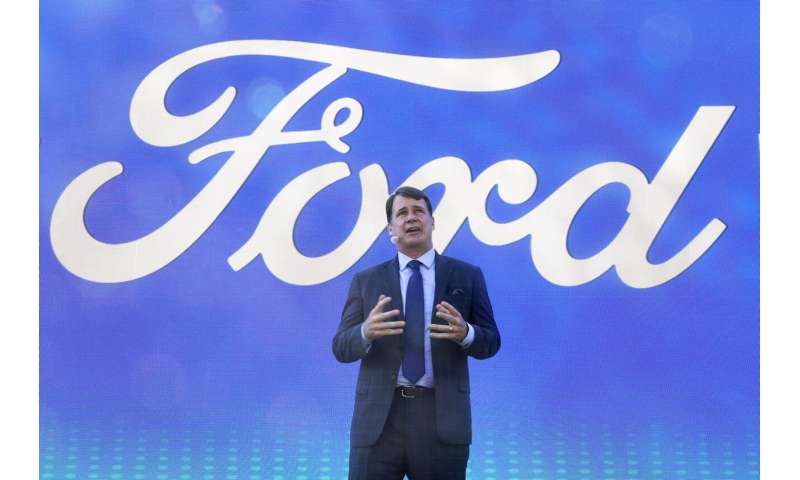

Jim Farley, Ford president and CEO, speaks during a presentation on the planned factory to build electric F-Series trucks and the batteries to power future electric Ford and Lincoln vehicles Tuesday, Sept. 28, 2021, in Memphis, Tenn. The plant in Tennessee is to be built near Stanton, Tenn. Credit: AP Photo/Mark Humphrey
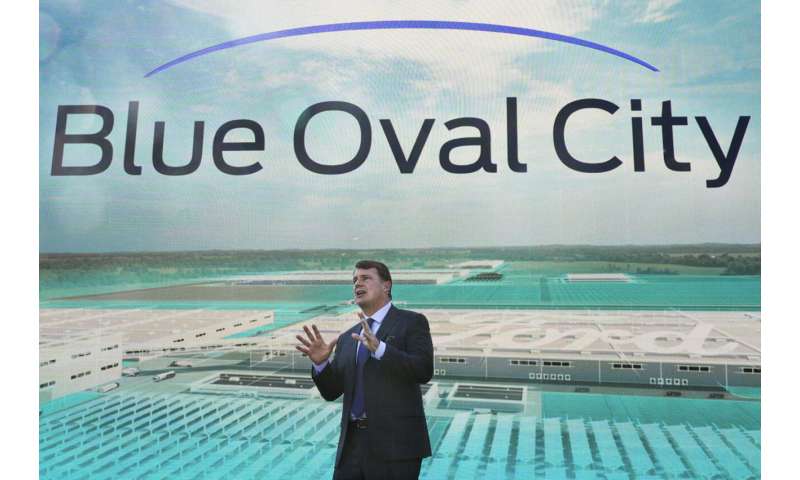

Jim Farley, Ford president and CEO, speaks during a presentation on the planned factory to build electric F-Series trucks and the batteries to power future electric Ford and Lincoln vehicles Tuesday, Sept. 28, 2021, in Memphis, Tenn. The plant in Tennessee is to be built near Stanton, Tenn. Blue Oval City is the name given to the facility's campus. Credit: AP Photo/Mark Humphrey
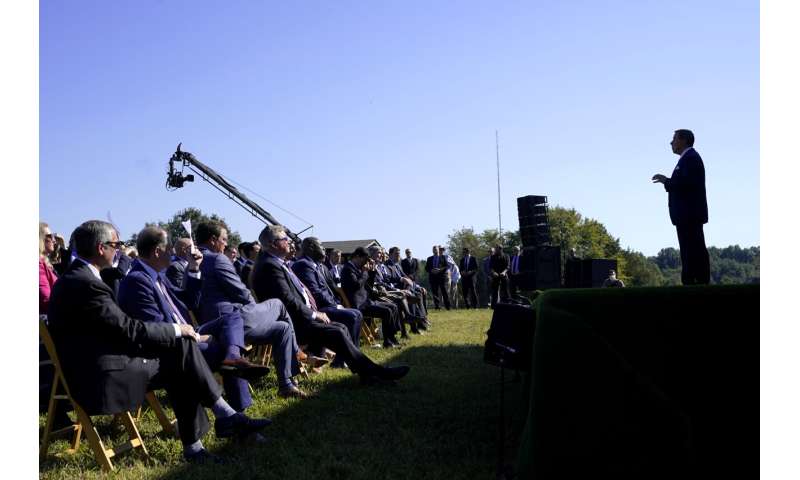

Ford Executive Chairman Bill Ford speaks during a presentation on the planned factory to build electric F-Series trucks and the batteries to power future electric Ford and Lincoln vehicles Tuesday, Sept. 28, 2021, in Memphis, Tenn. The Tennessee plant is to be built near Stanton, Tenn. Credit: AP Photo/Mark Humphrey
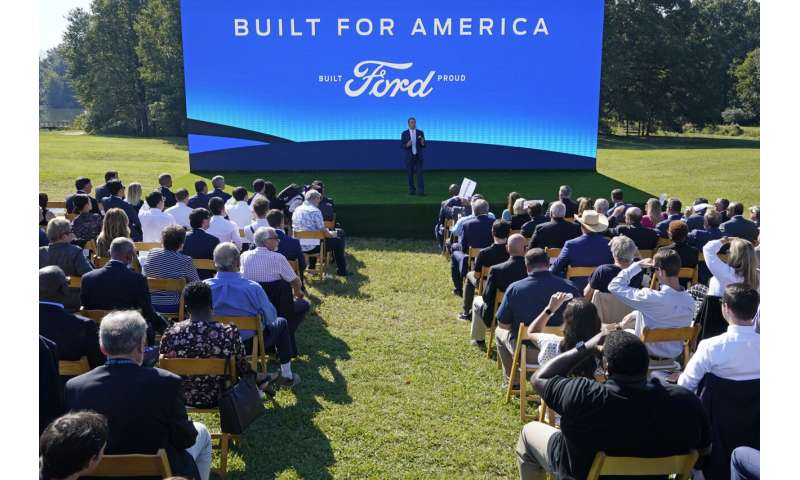

Ford Executive Chairman Bill Ford speaks during a presentation on the planned factory to build electric F-Series trucks and the batteries to power future electric Ford and Lincoln vehicles Tuesday, Sept. 28, 2021, in Memphis, Tenn. The Tennessee plant is to be built near Stanton, Tenn. Credit: AP Photo/Mark Humphrey


Tennessee Gov. Bill Lee, center, talks with Ford Executive Chairman Bill Ford, left, and Jim Farley, Ford president and CEO, right, after a presentation on the planned factory to build electric F-Series trucks and the batteries to power future electric Ford and Lincoln vehicles Tuesday, Sept. 28, 2021, in Memphis, Tenn. The plant in Tennessee is to be built near Stanton, Tenn. Credit: AP Photo/Mark Humphrey


This Monday, Sept. 27, 2021, photo shows a 1,551-acre field which will become the site of of a joint venture with Ford Motor Company and SK Innovation to create the $5.8 billion BlueOvalSK Battery Park in Glendale, Ky. The dedicated battery manufacturing complex is intended to supply Ford's North American assembly plants with locally assembled batteries. Credit: AP Photo/Timothy D. Easley
Adam Lobert, who was in Glendale at the end of a biking excursion and who lives in nearby Elizabethtown, said he could get behind battery-powered vehicles, but objected to the government boosting EVs by dangling tax credits.
As a self-professed "small government guy," he said: "I think battery-powered cars are a wonderful idea. ... But they've got to stand on their own."
Ford to add 10,800 jobs making electric vehicles, batteries
© 2021 The Associated Press. All rights reserved. This material may not be published, broadcast, rewritten or redistributed without permission.
Adam Lobert, who was in Glendale at the end of a biking excursion and who lives in nearby Elizabethtown, said he could get behind battery-powered vehicles, but objected to the government boosting EVs by dangling tax credits.
As a self-professed "small government guy," he said: "I think battery-powered cars are a wonderful idea. ... But they've got to stand on their own."
Ford to add 10,800 jobs making electric vehicles, batteries
© 2021 The Associated Press. All rights reserved. This material may not be published, broadcast, rewritten or redistributed without permission.
No comments:
Post a Comment